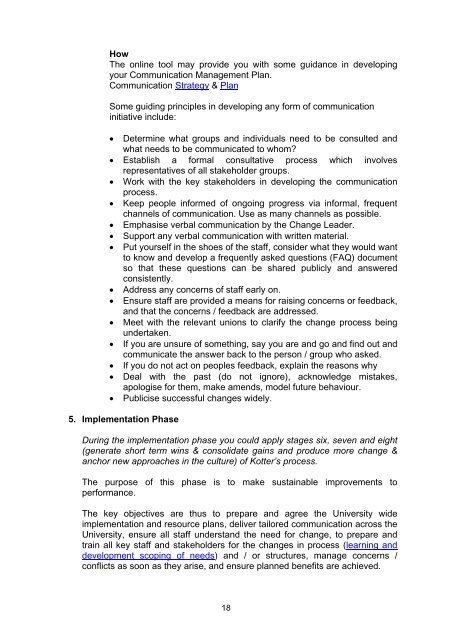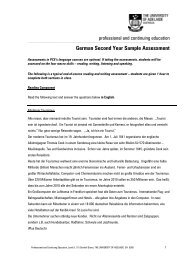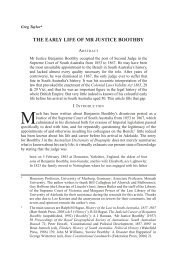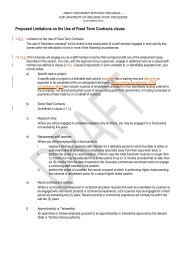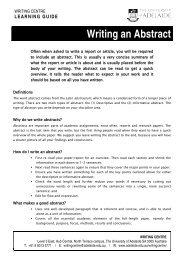Leading Change, Transition & Transformation - University of Adelaide
Leading Change, Transition & Transformation - University of Adelaide
Leading Change, Transition & Transformation - University of Adelaide
You also want an ePaper? Increase the reach of your titles
YUMPU automatically turns print PDFs into web optimized ePapers that Google loves.
How<br />
The online tool may provide you with some guidance in developing<br />
your Communication Management Plan.<br />
Communication Strategy & Plan<br />
Some guiding principles in developing any form <strong>of</strong> communication<br />
initiative include:<br />
• Determine what groups and individuals need to be consulted and<br />
what needs to be communicated to whom?<br />
• Establish a formal consultative process which involves<br />
representatives <strong>of</strong> all stakeholder groups.<br />
• Work with the key stakeholders in developing the communication<br />
process.<br />
• Keep people informed <strong>of</strong> ongoing progress via informal, frequent<br />
channels <strong>of</strong> communication. Use as many channels as possible.<br />
• Emphasise verbal communication by the <strong>Change</strong> Leader.<br />
• Support any verbal communication with written material.<br />
• Put yourself in the shoes <strong>of</strong> the staff, consider what they would want<br />
to know and develop a frequently asked questions (FAQ) document<br />
so that these questions can be shared publicly and answered<br />
consistently.<br />
• Address any concerns <strong>of</strong> staff early on.<br />
• Ensure staff are provided a means for raising concerns or feedback,<br />
and that the concerns / feedback are addressed.<br />
• Meet with the relevant unions to clarify the change process being<br />
undertaken.<br />
• If you are unsure <strong>of</strong> something, say you are and go and find out and<br />
communicate the answer back to the person / group who asked.<br />
• If you do not act on peoples feedback, explain the reasons why<br />
• Deal with the past (do not ignore), acknowledge mistakes,<br />
apologise for them, make amends, model future behaviour.<br />
• Publicise successful changes widely.<br />
5. Implementation Phase<br />
During the implementation phase you could apply stages six, seven and eight<br />
(generate short term wins & consolidate gains and produce more change &<br />
anchor new approaches in the culture) <strong>of</strong> Kotter’s process.<br />
The purpose <strong>of</strong> this phase is to make sustainable improvements to<br />
performance.<br />
The key objectives are thus to prepare and agree the <strong>University</strong> wide<br />
implementation and resource plans, deliver tailored communication across the<br />
<strong>University</strong>, ensure all staff understand the need for change, to prepare and<br />
train all key staff and stakeholders for the changes in process (learning and<br />
development scoping <strong>of</strong> needs) and / or structures, manage concerns /<br />
conflicts as soon as they arise, and ensure planned benefits are achieved.<br />
18


